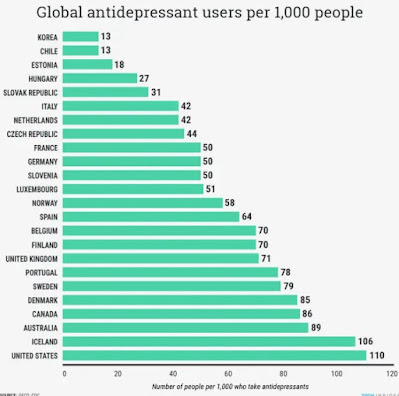Following the recent mass shooting at a Texas mall that claimed eight lives, Rep. Marjorie Taylor Greene, a prominent figure in right-wing politics, reiterated the common claim that antidepressants might be responsible for such incidents. She attributed the shooting at Allen Premium Outlets to "mental illness, drugs, and evil forces," calling for an examination of SSRIs (selective serotonin reuptake inhibitors), a type of antidepressant.
This is not the first time Greene has made comments linking antidepressants to mass shootings, and former Fox News host Tucker Carlson has also expressed similar views on his show, suggesting a correlation between psychotropic drugs like SSRIs and mass shooters.
However, psychiatrists and experts in the field maintain that there is little evidence to support the notion that these medications could increase tendencies toward violence. Are these experts just paid PR people from the big pharmaceutical industry?
David Rettew, a child and adolescent psychiatrist, emphasizes that blaming medications as the primary cause of mass shootings lacks supporting evidence and appears to be more of a political diversionary tactic than a scientifically sound theory.
What are SSRIs Drugs? They are commonly prescribed to treat depression, anxiety, and other mood disorders. These medications work by increasing the availability of serotonin in the brain through the blocking of its reuptake process.
SSRIs are considered relatively safe and have fewer side effects compared to similar medications. Potential side effects can include insomnia, headaches, nausea, agitation, and reduced sexual desire.
Regarding the question of whether antidepressants are linked to violence, the answer is complex. While antidepressants have been associated with higher suicide risk among young people, "experts" maintain that there is no evidence to suggest they increase violent tendencies or homicidal urges toward others.
Chase Anderson, a child and adolescent psychiatrist, explains that while rare side effects like irritability can potentially lead to increased agitation or aggression, there is no scientific proof that antidepressants cause individuals to plan premeditated acts of violence. But could it contribute?
While acknowledging that individual reactions are possible, Rettew points out that systematic studies have failed to find any connection between SSRIs and homicidal shootings.
When pressed for evidence supporting her claims about SSRIs and violence, Rep. Greene's office cited a tweet linking to a webpage listing school shooters who allegedly took psychiatric drugs. However, it is essential to approach such claims critically and consider the broader scientific consensus on the matter.
Over a four-year period, Germany witnessed a 46% surge in antidepressant usage. Similarly, Spain and Portugal experienced a roughly 20% increase during the same timeframe. Although Iceland had the highest overall usage rate, with approximately one in ten individuals taking daily antidepressants, this figure may underestimate the true extent due to its inclusion of non-adults.
While the United States was not initially included in the OECD analysis, it surpasses Iceland, with 11% of Americans over the age of 12 consuming antidepressants.
It is important to note that the prevalence of antidepressant use does not necessarily reflect the rates of depression. Rather, the popularity of antidepressants in a particular country is influenced by a complex combination of factors such as depression rates, societal stigma, socioeconomic status, healthcare coverage, and treatment availability.
For instance, in the United States, only about one-third of individuals with severe depression use antidepressants. Conversely, South Korea has the lowest antidepressant use among the analyzed countries, yet it has the highest suicide rate in the developed world. Research indicates that Koreans are more likely than Americans to view mental illness as a personal weakness, leading to a reluctance to seek treatment.
A review of depression in Nordic countries suggests that Iceland's high antidepressant usage is a result of both perceived effectiveness by users and limited access to alternative treatments like psychotherapy. However, the increasing rate of antidepressant consumption in Iceland has not shown any correlation with a decrease in suicide rates or disability caused by depression.
This rise in antidepressant consumption has sparked a debate regarding potential overprescription (medicalization) or underprescription (limited access to treatment).
The OECD proposes two potential reasons for the escalating rate of antidepressant usage worldwide. Firstly, the duration of treatment has become longer than before, and secondly, antidepressants are now prescribed for not only severe depression but also mild depression, anxiety, social phobia, and other conditions.
Prolonged antidepressant use aligns with international guidelines, as the World Health Organization recommends continuing treatment for at least nine to 12 months after recovery. However, it acknowledges that the evidence supporting this recommendation is moderate and further research is required.
In the United States, 60% of individuals taking antidepressants have been using them for at least two years, and 14% have been on them for a decade or longer. While this may seem in line with WHO's guidance, it masks a larger, more challenging issue.
Less than one-third of Americans taking antidepressants have had a recent appointment with a mental health professional within the past year. This suggests a critical flaw in the system where medication is widely available, often prescribed by primary care physicians, but comprehensive mental healthcare and regular monitoring are lacking. Read more.
Antidepressants & many other medications are significantly overprescribed in America
— Elon Musk (@elonmusk) June 6, 2023









